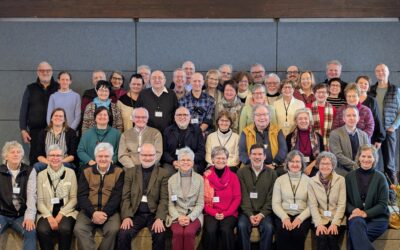 Ribeirão Preto, the new technology hub with 700,000 inhabitants. In recent years many people have migrated here from other Brazilian States in search of work. New apartments blocks are being being erected, each housing thousands of people. This was the case with the parish of Fr. Luis, where in April 2011 a large residential apartments block was built to house 4000 people. He decided along with the parishioners to take the first step toward the new inhabitants, even before they arrived, so that they had immediately someone to turn to. Fr. Luis recollects: “In those days, the beatification process of Pope John Paul II was in progress. For us, his life represented everything that we desired for our community: an openness to dialogue with all, welcoming, willing to forgive”. Therefore, they decided to entrust themselves to his protection “trying to characterize the new community on the life of the Gospel according to Chiara Lubich’s spirituality of unity”.
Ribeirão Preto, the new technology hub with 700,000 inhabitants. In recent years many people have migrated here from other Brazilian States in search of work. New apartments blocks are being being erected, each housing thousands of people. This was the case with the parish of Fr. Luis, where in April 2011 a large residential apartments block was built to house 4000 people. He decided along with the parishioners to take the first step toward the new inhabitants, even before they arrived, so that they had immediately someone to turn to. Fr. Luis recollects: “In those days, the beatification process of Pope John Paul II was in progress. For us, his life represented everything that we desired for our community: an openness to dialogue with all, welcoming, willing to forgive”. Therefore, they decided to entrust themselves to his protection “trying to characterize the new community on the life of the Gospel according to Chiara Lubich’s spirituality of unity”.  Even profitable activities were initiated, such as a cooperative that collected recyclable materials. The proceeds were divided into 2 parts: for those who worked there and for the rent of the premises. Others began to sell hot dogs, giving a portion of the proceeds to cover the cost of the chapel. The pastor narrates: “The sale of hot dogs took place in a neighbourhood inhabited by drug dealers. Those who went to sell them tried to give priority to the love of neighbour above all, welcoming everyone and recalling the words of Jesus: “I was hungry and you gave me something to eat.” This resulted in many people visiting the chapel and participating in the activities that took place therein». And furthermore, the coffee served after mass on Sunday mornings: “After mass we set a table with coffee, tea, sweets…. The people gather around and we speak on many topics. It is a beautiful moment of an exchange of experiences, mutual understanding, and the sharing of joys and difficulties”. “We’ve also started at the chapel a course of catechesis wherein we seek that the children not only know God but also feel loved by Him, even in the difficult situations of life they sometimes find themselves in. Every month we meet with those who want to participate and animate the community. They are always joyful moments of intense dialogue and brotherhood”. Fr. Luis and his parishioners’ work is demanding, but fruitful. How do they plan to go ahead? “We feel motivated to continue – concludes the parish priest – because we have witnessed an increase in mutual help and the people feel that the apartments block is truly everyone’s home”.
Even profitable activities were initiated, such as a cooperative that collected recyclable materials. The proceeds were divided into 2 parts: for those who worked there and for the rent of the premises. Others began to sell hot dogs, giving a portion of the proceeds to cover the cost of the chapel. The pastor narrates: “The sale of hot dogs took place in a neighbourhood inhabited by drug dealers. Those who went to sell them tried to give priority to the love of neighbour above all, welcoming everyone and recalling the words of Jesus: “I was hungry and you gave me something to eat.” This resulted in many people visiting the chapel and participating in the activities that took place therein». And furthermore, the coffee served after mass on Sunday mornings: “After mass we set a table with coffee, tea, sweets…. The people gather around and we speak on many topics. It is a beautiful moment of an exchange of experiences, mutual understanding, and the sharing of joys and difficulties”. “We’ve also started at the chapel a course of catechesis wherein we seek that the children not only know God but also feel loved by Him, even in the difficult situations of life they sometimes find themselves in. Every month we meet with those who want to participate and animate the community. They are always joyful moments of intense dialogue and brotherhood”. Fr. Luis and his parishioners’ work is demanding, but fruitful. How do they plan to go ahead? “We feel motivated to continue – concludes the parish priest – because we have witnessed an increase in mutual help and the people feel that the apartments block is truly everyone’s home”.
Look after Creation
Look after Creation




0 Comments